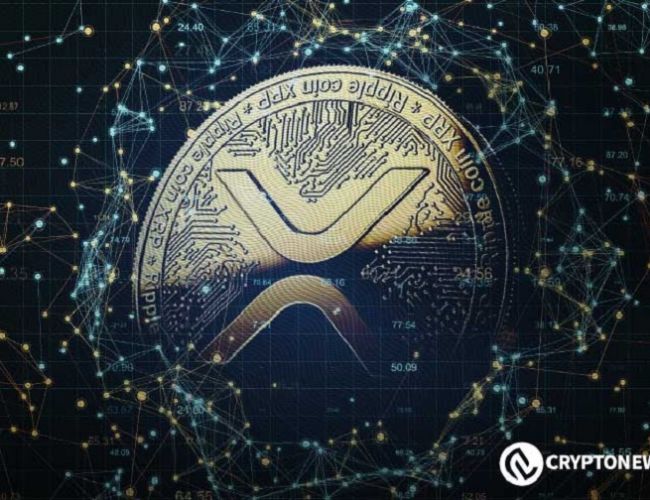Christine Lagarde Backs Payment System Interoperability for Easier Global Transfers

- Lagarde sees global payment unity as vital for smoother and more efficient money transfers.
- Ripple’s XRP enables fast and affordable solutions for seamless overseas transfers.
- Legal shifts may shape Ripple’s role in future international finance.
Christine Lagarde, former director of the International Monetary Fund , called for interoperability among payment systems to address the growing complexity of cross-border remittances. Lagarde emphasized that integrating systems worldwide could improve efficiency and reduce costs for international transactions. Her view aligns with blockchain-based platforms like Ripple, which aim to streamline global financial transactions by enhancing payment connectivity across borders.
Ripple and XRP: Transforming Frontier Deals
The firm’s model offers an alternative to traditional systems like SWIFT by processing orders nearly instantly, allowing financial businesses to bypass the lengthy processes common in mainstream banking. RippleNet, its enterprise blockchain, utilizes the coin for periodic liquidity, which helps clients avoid pre-funded accounts. This innovation has attracted the attention of the European Union as it seeks more efficient interconnected service options.
Christine Lagarde, former #IMF director, stresses the need for interoperability among payment systems to tackle cross-border remittance challenges
Well, the EU is already working with #Ripple, and XRP is a cross-border remittance protocol that bridges global payment systems pic.twitter.com/a5JJty0Ya3
— Black Swan Capitalist (@VersanAljarrah) November 3, 2024
Ripple’s unique consensus protocol, the Ripple Protocol Consensus Algorithm , verifies transfers within three to five seconds. XRP can handle up to 1,500 transactions per second, which supports the rapid and cost-effective international payments financial institutions seek.
Decentralized Security Features Set Ripple Apart
Ripple’s structure differs from traditional cryptocurrencies due to its unique security measures and transaction process. Unlike Bitcoin, which relies on mining, Ripple created a fixed supply of 100 billion XRP tokens. This supply management is maintained with a system that releases a controlled amount each month. Ripple’s validators, which are spread across over 150 independent global servers, verify transactions, adding an additional layer of security.
This collaborative system, along with a decentralized network, allows Ripple to provide reliable and secure transaction validation that appeals to financial entities needing stability and security for overseas transfers.
Adoption of Ripple, Legal Issues, and Ideas for the Future
Ripple’s success in inexpensive deals has led to adoption by large organizations such as Santander and MoneyGram, which seek better international transfer alternatives The SEC has filed a complaint against Ripple, claiming XRP functions as an unauthorized security, which could impact the startup’s operations if the ruling settles the contentions.




 Bitcoin
Bitcoin  Ethereum
Ethereum  Tether
Tether  Dogecoin
Dogecoin  USDC
USDC  Cardano
Cardano  TRON
TRON  Chainlink
Chainlink  Stellar
Stellar  Hedera
Hedera  LEO Token
LEO Token  Bitcoin Cash
Bitcoin Cash  Litecoin
Litecoin  Cronos
Cronos  Ethereum Classic
Ethereum Classic  Monero
Monero  Dai
Dai  Algorand
Algorand  OKB
OKB  Cosmos Hub
Cosmos Hub  Stacks
Stacks  Theta Network
Theta Network  Gate
Gate  Maker
Maker  KuCoin
KuCoin  Tezos
Tezos  IOTA
IOTA  NEO
NEO  Zcash
Zcash  Polygon
Polygon  Synthetix Network
Synthetix Network  Tether Gold
Tether Gold  TrueUSD
TrueUSD  Dash
Dash  Holo
Holo  Zilliqa
Zilliqa  Enjin Coin
Enjin Coin  0x Protocol
0x Protocol  Basic Attention
Basic Attention  Qtum
Qtum  Siacoin
Siacoin  Ravencoin
Ravencoin  Bitcoin Gold
Bitcoin Gold  Decred
Decred  NEM
NEM  DigiByte
DigiByte  Ontology
Ontology  Nano
Nano  Status
Status  Hive
Hive  Huobi
Huobi  Waves
Waves  Lisk
Lisk  Steem
Steem  Numeraire
Numeraire  Pax Dollar
Pax Dollar  BUSD
BUSD  OMG Network
OMG Network  Ren
Ren  Bitcoin Diamond
Bitcoin Diamond  Bytom
Bytom